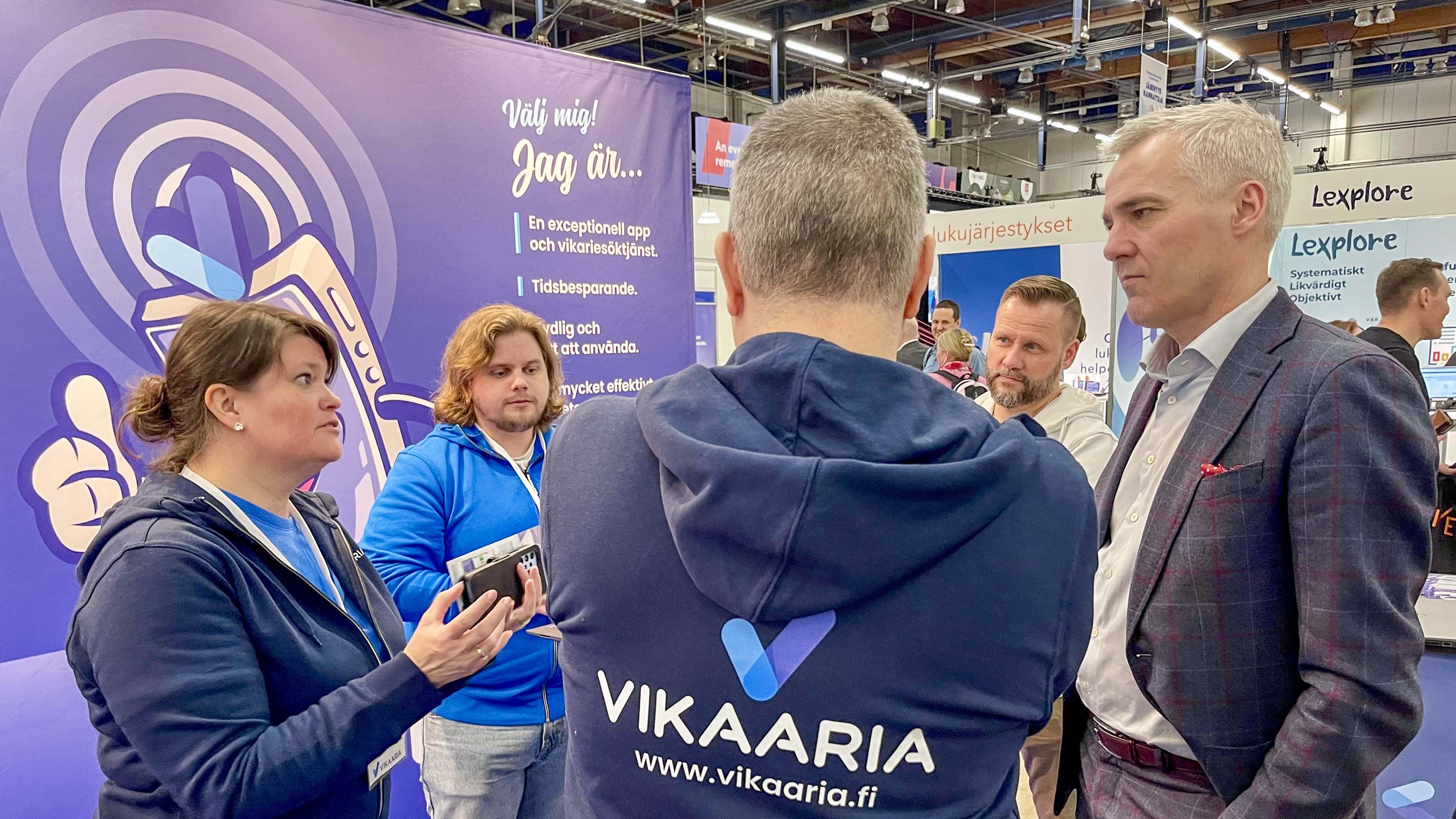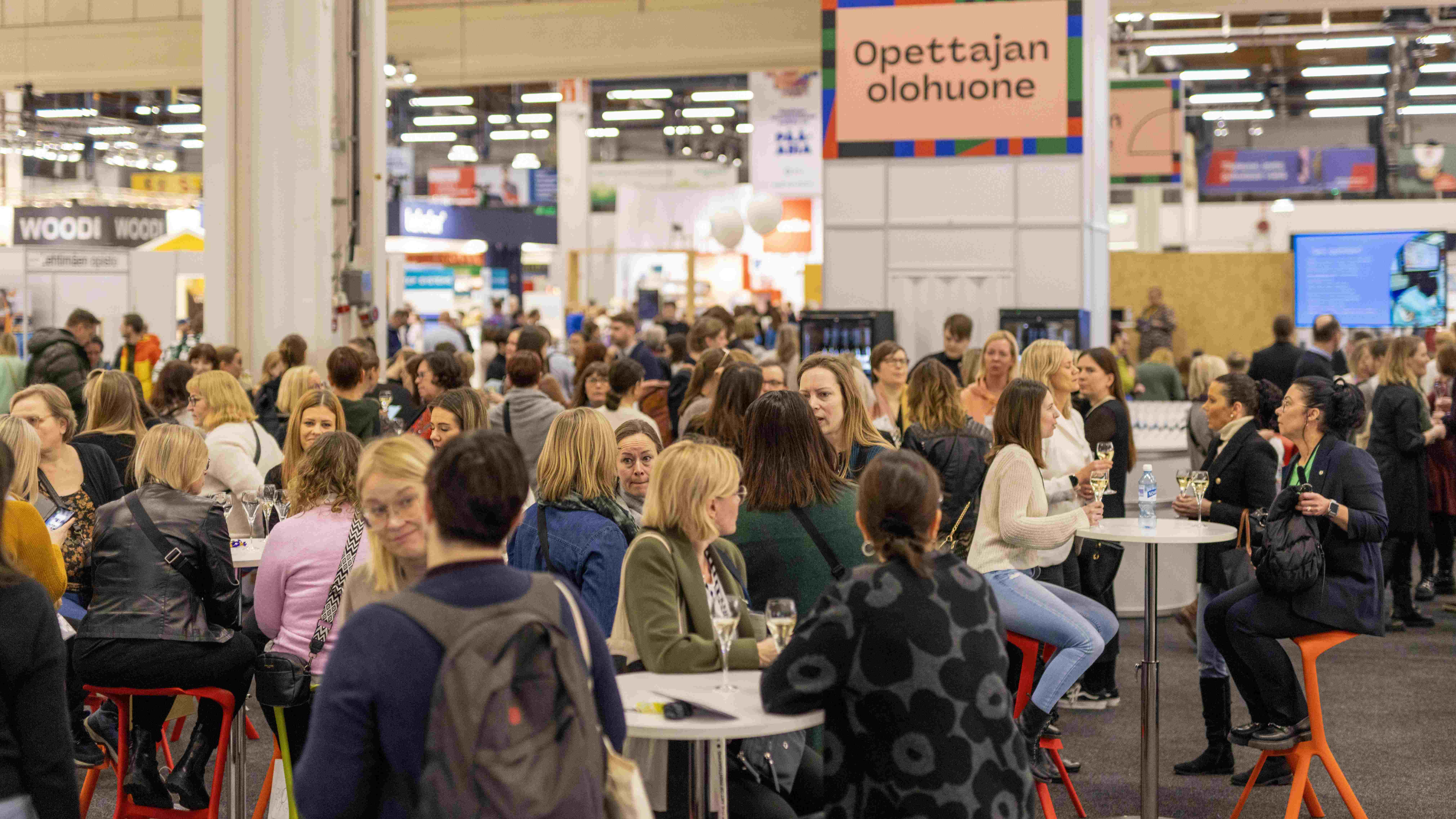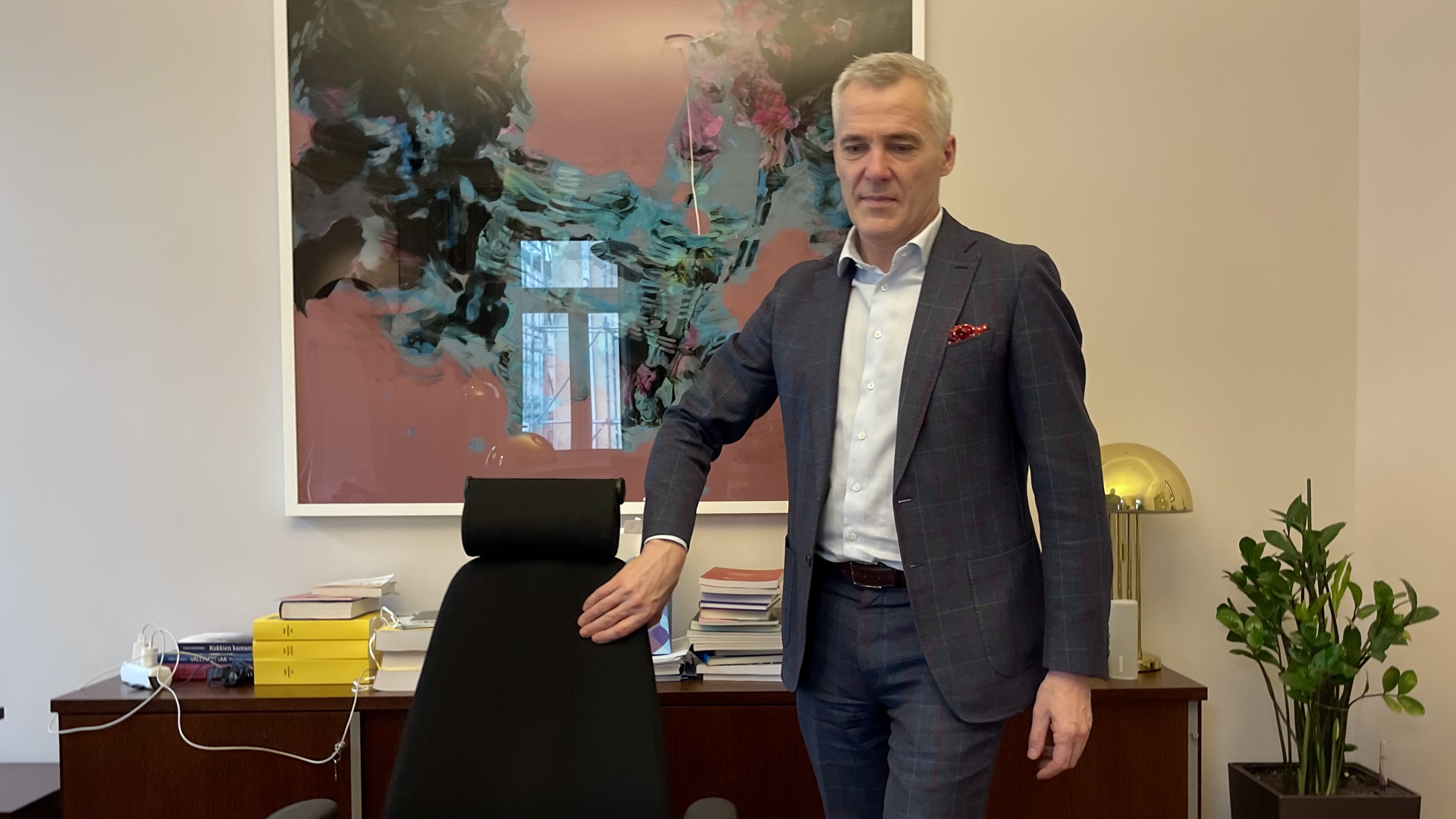Finland’s Minister of Cooperation: Put young people first in difficult times
A father of five children, young people and education are among Minister of Cooperation Anders Adlercreutz’s areas of expertise. These are also among the focus areas for the Nordic countries in the coming year.
Many projects from previous presidencies carried on when Finland and Åland took on the Presidency of the Nordic Council of Ministers at the start of 2025.
“The red thread remains. We are looking for continuity in the Nordic cooperation,” says Finland’s Minister for Nordic Cooperation Anders Adlercreutz.
He enjoys his job as Minister for Cooperation, even though it is not “as operative” as the EU Council of Ministers. Discussions and the sharing of opinions also have value, he said in answer to criticism that the Nordic Council is powerless.
According to Adlercreutz, fighting border obstacles forms a central part of cooperation. This is an area where Nordic cooperation is visible on a concrete, practical level. This applies to travel, work, studies, trade, and everything else that must function across borders.
Resilience and preparedness have been introduced as new areas of cooperation now that security policy has become increasingly important. Adlercreutz also mentions the prime ministers' declaration that the Nordic region will become the world's most integrated and sustainable region by 2030.
Anders Adlercreutz left his Minister of European Affairs position last summer when Anna-Maja Henriksson was elected to the EU Parliament. He became both Minister of Education and Cooperation and chair of the Swedish People’s Party of Finland.
Making it safe to start a family
What does the prioritisation of children and young people mean in concrete terms?
“For example, it involves recognising that mental health issues have increased among young people. There is Nordic cooperation on a ministerial level on how to address this.”

Anders Adlercreutz meets the newly founded company Vikaaria – a substitute placement service for the education sector – during the Educa trade fare.
The ministers have also been discussing the use of mobile telephones and the need for schoolchildren to engage in physical activities and exercise. Examples from Norway have been studied in this regard.
There has also been an awakening to the demographic challenges with low birth rates, says Adlercreutz. Finland has no solution to the problem, which is shared throughout the Nordics.
But the minister envisages an equal society with high levels of mobility, where everyone can trust their own future. As you grow up and get an education, you should know that this also leads to work with safe jobs and opportunities for advancement.
People also dare start a family in a society with good childcare facilities and high-quality schools. All this builds trust and confidence, and it motivates people to dare to start a family and have children, says Anders Adlercreutz.
He would also like to see a discussion on parenthood in general.
“There is no perfect model to strive for and have ready before you start a family. The expectations placed on parents might not always be entirely reasonable. In Finland, we wonder whether this, in turn, could lead to people postponing starting a family."
Tougher economic conditions
The Finnish government talks about prioritising children and young people but is criticised for creating tougher economic conditions for schools and families with children.
“We have faced some criticism, but it is also worth looking at the bigger picture which includes a massive adjustment package aimed at saving nine billion euro in the budget,” says Adlercreutz.
Adjustments have been made through index freezes, such as concrete cuts to student support and more.
But Adlercreutz considers this to be planning for the future and securing a more stable foundation on which to build the future. Schools and children’s well-being also receive investments worth several hundred million euro, points out Adlercreutz.
Focus on literacy and mathematics
Education has been Finland’s pride, but in recent years, Pisa assessments have shown declining academic results in schools across the entire Nordic region.
“Of course, this is concerning. Finland does want to be the best in the world, and that should remain our goal. We are working to identify the key issues. The most important shortcomings will be addressed in the long term, but first, additional teaching hours will be introduced for mathematics and mother tongue/literacy.

Anders Adlercreutz attended the Nordic region's largest fair for teachers, participating in a panel debate between Prime Minister Petteri Orpo and SDP Chairman Antti Lindtman. (Photo: Helsingfors Mässcentrum/Educa)
Basic skills must be strengthened, says Anders Adlercreutz. A strong correlation was observed between literacy and performance in the other school subjects, especially among first- and second-generation Finns.
This is also where limiting mobile telephone use comes in. You try to create space for studying, focus, calm classroom environments – and also outside, points out Adlercreutz.
He wants to create space for sports or reading – both of which are better ways to spend your time than using six hours a day scrolling.
Anders Adlercreutz wants to create an environment that fosters the concentration and specialisation that the labour market needs, also required for lifelong learning.
He hastens to add that this is not about being anti-tech or going “against digitalisation”. This is about finding the right balance.
Adlercreutz also highlights the need for greater exchange of experiences in his own sector, such as school and student exchanges between the Nordic countries.
"The Nordplus exchange and Erasmus in the Nordic countries should be a given for Finnish students. After graduating from upper secondary school, it should be easy to consider university studies in Uleåborg, Tammerfors, or Uppsala."
“Your world should not be limited to your own country, rather, you should see the Nordic region as your home market. Not only in terms of work but also studies," envisions Adlercreutz.
Similarities and differences between the Nordics
A lot has been said about the similarities between the Nordic countries. But there are also differences between Nordic education systems. One practical example is Finland’s free school meals.
“I also imagine that teachers’ positions differ in the different countries. The attractiveness of the teaching occupation varies. Here, we are very fortunate in Finland. There is a decent level of interest in teacher programmes,” says Adlercreutz.
Finland also requires teacher graduates to have a master's degree. Therefore, a very large percentage of Finland's teachers have teaching qualifications, which is not a given in the other Nordic countries.
“The way our schools are structured also differs quite a bit from, for example, Sweden. In practical terms, we have municipal schools and no free schools (privately run schools funded by public money). These may certainly have some advantages but I don’t think this should be the way to go for Finland.
“Finland’s primary school system’s fundamental strength has been that it is equal and accessible to all on the same terms. A school in Pori is the same as a school in Porvoo. Finland has had a relatively low level of ‘school shopping’, which I think is something we should maintain and protect,” says Anders Adlercreutz.

The Teachers' Lounge at the Nordic region's largest fair for teachers. (Photo: Helsinki Fair Centre/Educa)
Adlercreutz has led The Swedish Parent Association in Finland. The association exists in various forms in the Nordic countries, even though the relationship between schools and life outside might vary.
Minister Anders Adlercreutz highlights Nordic societies' strength when it comes to the relationship between children and school. Nordic children enjoy quite a lot of freedom. We trust the schools, we trust our children.
“Children go back and forth to school on their own. We trust that the world is not quite as dangerous as perhaps is the case in many other countries.”
The political game
Recently a debate emerged in Finland surrounding the board game Afrikan tähti (also known as The Lost Diamond), in which players aim to collect as many gemstones as possible.
Many are calling for the game to be banned, arguing that it is racist and promotes a harmful, stereotypical portrayal of Africa and its inhabitants.
Adlercreutz would rather the game was used in education as a tool to discuss current affairs and history.
“Fortunately, we see the world differently now than we did in the 1950s when this game was created. This is something we could use to talk about how Finland and the world have changed,” he says.
“While what was unusual becomes more usual and immigration increases, I still have the impression that language use has become harsher, as has the general attitude, both in schools and society as a whole.”
The general attitude toward diversity is probably better. However, extreme opinions are louder and sometimes receive more attention.
Adlercreutz feels the racism debate has been politicised and immigration has become even more of a political battleground than before.
“When we talk about demography, I think it is extremely difficult to find a single national economist in Finland who would disagree that the country needs immigration and that Finland cannot manage our labour shortages without it,” says Adlercreutz.
Uncertain times call for unity
Yet, there is one party in the Finnish government that takes a critical or even outright rejecting stance on immigration. The Finns Party has a different view of the situation than Adlercreutz and his Swedish People’s Party.
“This is part of the political reality in Finland today. The four parties in this coalition need to arrive at something that everyone can agree on.”
Adlercreutz wants a facts-based analysis of the situation which can define the public debate, not fears, irrational threats or the need to box people into different corners. But he is also concerned about the tone of the discourse and the political developments.
“Yes, I worry about that, in Finland, the Nordics, Europe and globally. I believe an inclusive society is more resilient. A society where you don’t build walls or create conflicts, but look for ways to cooperate and function together to become far better prepared for different crises.”
Adlercreutz also considers the security situation in the Baltic Sea and the external threats facing Europe.

Anders Adlercreutz enjoys his role as Minister for Nordic Cooperation.
“We have a war in Ukraine but also strong Russian hybrid action where narratives are created to sow division in Europe. They spread fears about immigration, discredit climate research and exploit culture war metaphors to create inner conflict.”
Anders Adlercreutz is happy that the Nordic region has shown itself to be reasonably resilient.
“Our education systems and media literacy have helped us withstand these pressures better than many other countries. I hope this can serve as a guiding principle for our politics in Europe,” says Adlercreutz.
Adlercreutz hopes the Nordic example can serve as a beacon in European contexts. This could inspire the Nordic countries to have the political will to take on a slightly larger role in Europe, working to counter polarisation by fostering structures built on both understanding and resilience.
- Finland's Presidency
-
Anders Adlercreutz is Minister for Education and Nordic Cooperation.
 Follow us on Facebook
Follow us on Facebook
